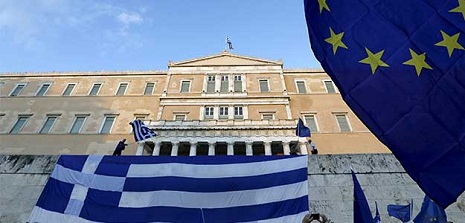"The [Greek] parliament voted for all these measures, except for the postponed pension reform, on July 15," she said.
In addition, the Greek parliament is required to approve amendments to the Civil Procedure Code and integrate the European directive on banks into the national legislation. These measures will be put to vote in the Greek parliament on July 22, the government’s spokeswoman said.
"Immediately after the above laws, which were advanced [by creditors] as conditions, are passed, talks will begin with the creditor institutions with the term of their completion on August 20," Gerovasili said.
The Greek government has also clearly indicated that "changes in the taxation of farmers are not included in the terms for the start of talks and all the publications on the intended postponement of the adoption of these measures till early August are absolutely unfounded," the Greek government’s spokeswoman said.
The leaders of eurozone countries agreed in broad outline at their July 12 summit on a new bailout program for Greece that stipulated profound reforms in the Hellenic Republic in return for the EU’s financial support.
"This agreement allows Greece to stay in the eurozone on condition that it complies with the EU rules," French President Francois Hollande said after the summit, summing up the results of the Greek debt talks.
The European leaders have managed to achieve the main goal of the negotiations and "keep the unity, integrity and solidarity of the eurozone," the French president said.
"The goal was also to give hope to Greece and the Greek people," Hollande said.
An agreement with Greece has been reached and the terms of starting negotiations on a new aid package have been worked out, German Chancellor Angela Merkel said at a press conference after the summit.
"We have opened the way for new aid," the German chancellor said, adding all the conditions were present for starting negotiations on an aid program for Greece as part of the European Stability Mechanism (ESM).
The EU’s aid for Greece may reach €82-86 billion over three years, the German chancellor said.
The Eurogroup of eurozone finance ministers "is ready to agree on additional measures, if necessary, but Greek debt write-off is not on the agenda, the German chancellor said.
The Greek parliament must "adopt basic legislative acts on reforms before July 15," Merkel said at the time.
Top priority measures include the reform of value-added tax (VAT), reorganization of the national statistical agency and changes in the Greek pension system, the German chancellor said.
"We have managed to reach agreement, although confidence was lost," Merkel said.
"Athens still has to negotiate a long and difficult path," the German chancellor said.
The EU’s new bailout deal follows a referendum held in Greece on July 5, in which Greek Prime Minister Alexis Tsipras urged Greeks to reject the international creditors’ ultimatum for tight austerity measures in the country in exchange for bailout funds.
The referendum results showed that most Greeks (61%) voted against the creditor terms.
Since 2010, when Greece’s sovereign debt crisis broke out, Athens has received €240 billion in bailout loans from the EU and the International Monetary Fund (IMF). Despite a partial debt write-off in 2012, Greece’s sovereign debt currently exceeds €315 billion or 175% of its GDP. This figure is almost three times the debt-to-GDP ratio set for the eurozone countries, which should not exceed 60% of GDO according to the EU’s Stability and Growth Pact.
Greece’s international creditors say the Hellenic Republic can receive further financial aid, if the government undertakes to implement further austerity measures in the country.
Tsipras earlier urged the international creditors to write off 30% of Greece’s debt.
More about:
















































